Hire experienced
Salesforce developers
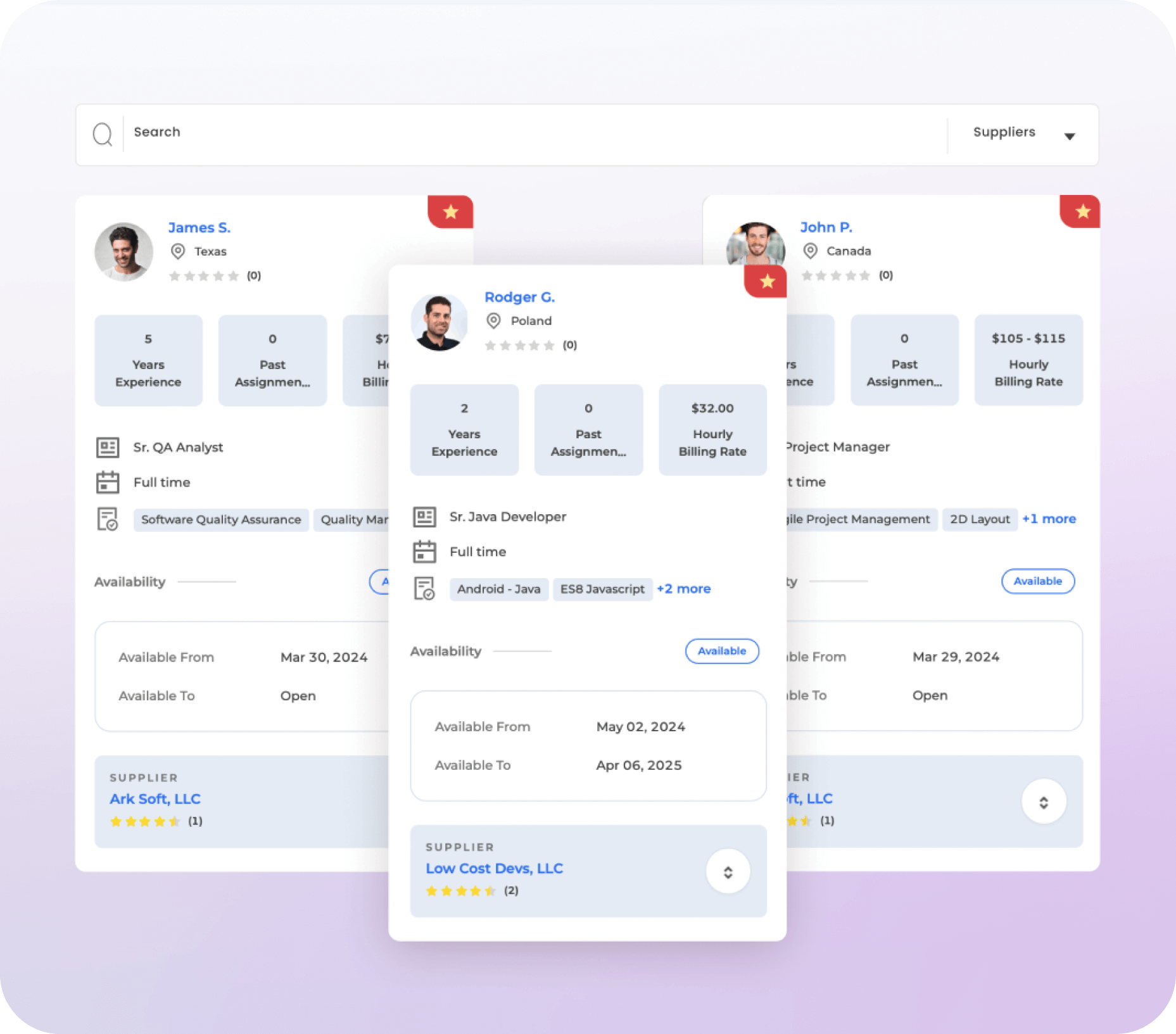
Need help filling
your Salesforce development roles?
Accelerate your product delivery and close your project’s Salesforce development skill gaps
quickly, efficiently and affordably by working with our incredible talent partners.

Full-time hires
Receive perfectly matched Salesforce developer candidates in record time by engaging with hundreds of local recruiting firms on our platform ready to take on your hard-to-fill Salesforce developer roles.

Temporary resources
Hire a Salesforce developer or build a whole team of Salesforce developers by working with hundreds of staffing agencies and talent vendors dedicated to finding the best talent for your business needs.
Find better talent at lower cost
Reduce billing rates
Lower your contract resource
billing rates by up to
40%
Optimize hiring time
Speed up hiring timelines for
your open roles by up to
30%
Increase candidate flow
Increase number of candidates for your open roles by up to
50%
Reduce talent acquisition costs
Reduce your talent
acquisition costs by up to
30%
Find better talent at lower cost
Reduce billing
rates
Lower your contract resource billing rates by
40%
Reduce talent acquisition costs
Reduce your average talent acquisition costs by
30%
Optimize
hiring time
Speed up hiring timelines for
your open roles by up to
30%
Increase candidate flow
Increase number of candidates for your open roles by up to
50%
Leverage our innovative hiring process
Post your open roles
Share your exact search requirements and connect with top-notch agencies that specialize in your role and industry.
Receive matching profiles
Get well-matched profiles of suitable candidates from multiple vendors for your evaluation and review.
Choose best candidate
Interview and select the best candidate for the job, while receiving continuous support from agency recruiters.
Hire and onboard
Onboard your new hire onto your project team within days of posting your open vacancy on our platform.
Leverage our innovative hiring process
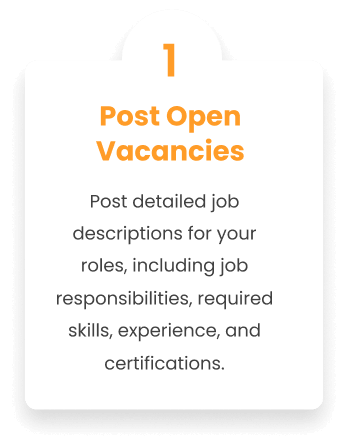
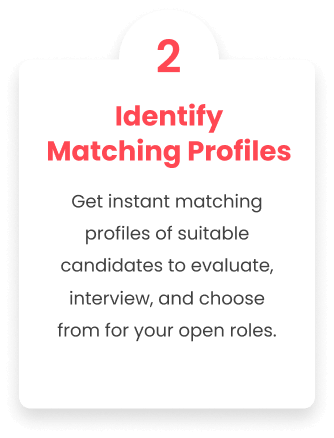
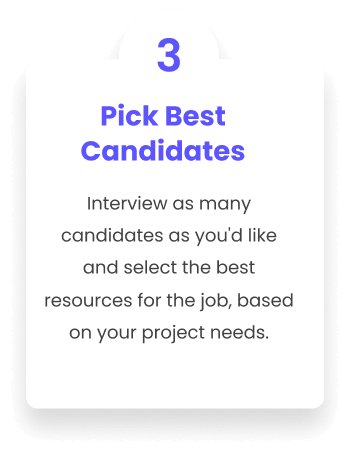
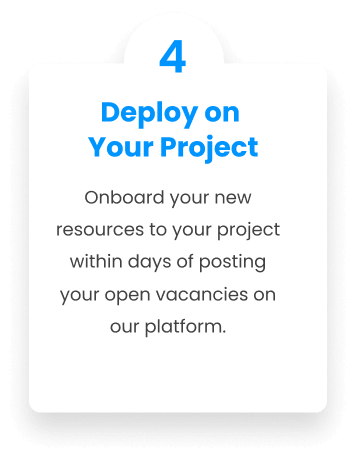

What our clients say about
working with us
You are in good company.
Brian Chen
Director, Web Development, Tessera
Emily Sandler
HR Manager, Near Solutions
Michael Zhang
Director, Talent Acquisition
Susie Davis
HR Manager
Angela Gomez
Senior QA Manager, Alere
David Kim
Senior Project Lead
Nathan Wright
Recruiting Lead, Carestream
Sam Moralez
Senior Program Manager, JDA Soft
Frequently asked questions about hiring Salesforce developers
Frequently asked questions
about hiring Salesforce developers
To hire Salesforce developers on Sourcer, start by posting your open vacancy with detailed job requirements and desired skills for a Salesforce developer role. Our talent suppliers will submit matching resource profiles of suitable Salesforce developer candidates from their resource pools who are immediately available to join your project team. Review the submissions and shortlist Salesforce developer candidates based on their profiles, skillsets, education, and job experience. Schedule interviews with your top choices for Salesforce developer roles directly through our platform. Finally, select the best candidate for your Salesforce developer vacancy and start the engagement directly on our platform.
The process for hiring Salesforce developers on Sourcer is fast and efficient, thanks to a vast pool of immediately available local and remote Salesforce developer resources available on our platform. You will typically receive Salesforce developer profile submissions from our talent suppliers within 48 hours of posting your Salesforce developer vacancy. Once you have interviewed and selected your preferred Salesforce developer candidates, they can start working almost immediately. The whole process of hiring a Salesforce developer could take as little as two to three days if your team is ready to interview Salesforce developer candidates immediately and can make a hiring decision quickly.
On Sourcer, you can expect to find a wide range of billing rates for Salesforce developers, typically ranging anywhere from $20 to $200 per hour. The exact rate depends on the candidate’s seniority, expertise, and location. This allows you to choose the best fit for your project’s budget and requirements. Your account manager will be able to provide you with additional guidance on prevailing Salesforce developer billing rates for each location type if needed.
The number of Salesforce developer candidates offered for your review on Sourcer depends on the popularity of the skillset, the number of currently available qualified Salesforce developer candidates on our platform, and how long the vacancy remains open in the system. Popular roles and competitive offers typically attract more submissions, giving you a broader selection of Salesforce developer candidates to choose from. On average, you can expect at least 20-30 Salesforce developer candidates to be submitted for your review.
No, not all Salesforce developer candidates on Sourcer are remote. We offer both local and remote candidates to suit your specific project needs. We have Salesforce developer candidates for any location type you may need – onsite, onshore, nearshore and offshore. However, keep in mind that the more restrictive your requirements are, the fewer Salesforce developer candidates you may have to choose from.
You can hire a single Salesforce developer or an entire team of Salesforce developers through Sourcer. It is completely up to you as a client. We can accommodate both options based on your project needs, providing the flexibility to scale your workforce up or down as required. We have thousands of immediately available candidates, including Salesforce developers, on our platform to choose from.
The Salesforce developer candidates offered to you through Sourcer are generally not available or even discoverable by your recruiting team via any other channels. Sourcer offers you more candidates to pick from along with the best billing rates for any Salesforce developer role. Also, unlike other platforms, the candidates we present to you are not freelancers who may end up being unreliable, produce poor quality of work and disappear on you at any moment. EverySalesforce developer candidate offered for your review via our platform has been fully vetted and has their employer backing them to ensure high quality of work, great reliability and full compliance.
Guidelines for
hiring Salesforce developers
With businesses increasingly relying on digital platforms to manage customer relationships and streamline operations, the demand for Salesforce developers continues to rise. Whether you’re an HR professional, recruiter, or business owner, understanding the intricacies of hiring Salesforce developers is essential to building a robust team. This comprehensive guide answers common questions about hiring Salesforce developers, offering expert insights to help you find the best talent for your organization.
What is Salesforce Development?
Salesforce development involves creating, configuring, and customizing applications within the Salesforce platform—a leading Customer Relationship Management (CRM) solution. It integrates with various business operations, including sales, marketing, customer service, and analytics. Salesforce development encompasses several layers, from the user interface and process automation to data management and integration with other systems.
The Salesforce Platform
Salesforce provides a variety of tools and services, such as Sales Cloud, Service Cloud, and Marketing Cloud, tailored for specific business needs. The platform is known for its flexibility, extensive API capabilities, and robust ecosystem, allowing developers to build tailored solutions that enhance business processes and improve customer engagement.
What does a Salesforce developer do?
Salesforce developers are specialized professionals who utilize Salesforce’s suite of tools and technologies to design, code, and implement custom solutions on the Salesforce platform. Their responsibilities include:
- Custom Application Development: Using Apex (Salesforce’s proprietary programming language) and Visualforce to build customized applications tailored to specific business requirements.
- Integrations: Connecting Salesforce with other systems and platforms to ensure seamless data flow and unified business processes using tools like Salesforce APIs and middleware platforms.
- Configuration and Customization: Leveraging Salesforce’s built-in features to configure and customize processes, workflows, and interfaces to align with business needs.
- Data Management: Ensuring data integrity and security within the Salesforce environment, often involving complex data migrations and management strategies.
- Implementation and Deployment: Managing the deployment of new features and functionalities from development environments to production environments using tools like Salesforce DX (Developer Experience).
- Support and Maintenance: Providing ongoing support, troubleshooting, and maintenance to ensure the smooth operation of Salesforce applications and integrations.
How are Salesforce developers usually being used?
Salesforce developers are versatile and can be employed in various capacities to meet the specific needs of an organization. Here are some common scenarios:
- CRM Customization: Tailoring Salesforce functionalities to fit the unique processes and workflows of the business, enhancing overall efficiency.
- Integration Projects: Connecting Salesforce with other enterprise systems, such as ERP, marketing automation, and finance systems, to ensure seamless data exchange and process automation.
- Sales and Service Automation: Developing custom tools and features to automate sales processes, customer service workflows, and reporting mechanisms for enhanced productivity.
- AppExchange Development: Creating applications for Salesforce’s marketplace (AppExchange) that can be sold or used within the business, extending Salesforce capabilities.
- Analytics and Reporting: Utilizing Salesforce’s analytics tools to build custom dashboards and reports that provide actionable insights into business performance.
Required skills and qualifications
Hiring a competent Salesforce developer requires a thorough understanding of the essential skills and qualifications. Here’s what you should look for:
Technical Skills
- Programming Languages: Proficiency in Apex, Visualforce, and Lightning Web Components (LWC) is critical.
- Salesforce Platform Knowledge: In-depth understanding of Salesforce administration, configuration, and customization.
- Integration Experience: Familiarity with REST and SOAP APIs, along with tools like MuleSoft for integrating Salesforce with other systems.
- Data Management: Skills in data modeling, data migration, and ensuring data integrity within Salesforce.
- Declarative and Programmatic Development: Ability to use both declarative tools within Salesforce (like Process Builder and Flow) and custom code to achieve desired functionalities.
Soft Skills
- Problem-Solving: Strong analytical skills to troubleshoot issues and design effective solutions.
- Communication: Ability to articulate technical concepts to non-technical stakeholders and collaborate effectively within a team.
- Time Management: Efficiently managing tasks and meeting deadlines in dynamic environments.
- Adaptability: Being open to learning new technologies and methodologies as Salesforce evolves.
Educational Background
- A degree in Computer Science, Software Engineering, or a related field is often preferred.
- Salesforce certifications, such as Salesforce Certified Platform Developer I and II, can significantly enhance a candidate’s profile.
Experience
- Previous work experience in Salesforce development roles, internships, or notable projects provides practical insights.
- Contributions to the Salesforce community, such as participating in forums or contributing to open-source projects, can be valuable indicators of a candidate’s expertise and dedication.
Popular Salesforce development languages and libraries
Salesforce developers use an array of languages and libraries tailored for the Salesforce platform. Here are some of the most popular ones:
Apex
Apex: Salesforce’s proprietary programming language, similar to Java, used for developing custom business logic and workflows within the Salesforce platform. Apex allows developers to create complex applications that can run on the Salesforce platform, handling tasks that go beyond the capabilities of standard Salesforce tools.
Visualforce
Visualforce: A framework for creating sophisticated, custom user interfaces and pages within Salesforce. It utilizes a tag-based markup language similar to HTML, along with Apex controllers to manage the user interface logic.
Lightning Web Components (LWC)
Lightning Web Components (LWC): A modern framework based on web standards for building reusable components in Salesforce. It leverages JavaScript, HTML, and CSS to create high-performance and dynamic user interfaces.
SOQL and SOSL
Salesforce Object Query Language (SOQL): A query language similar to SQL, used for querying Salesforce data.
Salesforce Object Search Language (SOSL): A search language used to perform full-text searches within Salesforce records.
Popular Salesforce development languages and libraries
Salesforce developers use an array of languages and libraries tailored for the Salesforce platform. Here are some of the most popular ones:
Apex
Apex: Salesforce’s proprietary programming language, similar to Java, used for developing custom business logic and workflows within the Salesforce platform. Apex allows developers to create complex applications that can run on the Salesforce platform, handling tasks that go beyond the capabilities of standard Salesforce tools.
Visualforce
Visualforce: A framework for creating sophisticated, custom user interfaces and pages within Salesforce. It utilizes a tag-based markup language similar to HTML, along with Apex controllers to manage the user interface logic.
Lightning Web Components (LWC)
Lightning Web Components (LWC): A modern framework based on web standards for building reusable components in Salesforce. It leverages JavaScript, HTML, and CSS to create high-performance and dynamic user interfaces.
SOQL and SOSL
Salesforce Object Query Language (SOQL): A query language similar to SQL, used for querying Salesforce data.
Salesforce Object Search Language (SOSL): A search language used to perform full-text searches within Salesforce records.
- United States: Salaries for Salesforce developers can range from $90,000 to $160,000 annually, depending on the region. Developers in tech hubs such as San Francisco and New York often command higher salaries.
- Europe: In major cities like London or Berlin, salaries typically range from €50,000 to €100,000, with senior roles fetching higher pay.
- Asia: Salaries in countries like India range from ₹700,000 to ₹2,000,000 per year, with variations based on experience and expertise.
- Entry-Level Developers: Generally earn between $70,000 and $90,000 annually in the U.S.
- Mid-Level Developers: With around 3-5 years of experience, annual salaries range from $90,000 to $120,000.
- Senior Developers: 5+ years of experience can command salaries from $120,000 to $160,000 or more annually.
- Freelancers: Charge on an hourly basis, rates typically range from $50 to $150 per hour based on expertise and market demand.
- Contract-Based: Pay varies based on project scope, duration, and complexity. Short-term contracts may be higher on an hourly basis to account for the temporary nature of the work.
How to find Salesforce developers for your team?
Finding qualified Salesforce developers can be challenging, but these strategies can help streamline your search:
Job Posting Sites
- LinkedIn: A major platform for networking and job postings, particularly suited for technical roles.
- Indeed: A broad job search engine that caters to a wide audience.
- Glassdoor: Provides company reviews along with job postings, helping you enhance your employer brand.
Salesforce Community Sites
- Salesforce Trailblazer Community: Engage with Salesforce professionals and participate in forums and groups.
- Salesforce AppExchange: Check applications built by developers and connect with professionals.
Developer Portfolios and Git Repositories
- GitHub: Explore open-source projects and repositories to assess potential candidates’ skills.
- Personal Websites: Review portfolios and personal projects highlighted by developers on their sites.
Recruitment Agencies
- Specialized Tech Agencies: Often have a pool of pre-vetted Salesforce developers, which can significantly speed up the hiring process.
- General Recruitment Firms: Can provide valuable assistance in broadening your talent search.
Networking Events
- Salesforce Community Events: Attend local Salesforce user groups, meetups, and events to network with professionals.
- Industry Conferences: Engage with experts and candidates at Salesforce-specific conferences like Dreamforce.
Employee Referrals
- Referral Programs: Encourage current employees to refer qualified candidates by offering referral bonuses. Employees often have connections within the industry and can help you find candidates faster.
Certification Verification
- Salesforce Certification: Ensure you verify the certifications held by potential candidates through Salesforce’s credentialing system to validate their expertise.
By implementing these strategies, you can effectively find and attract top Salesforce development talent.
- Quality Assurance: Sourcer connects you with pre-vetted developers who have been assessed for their skills and experience, reducing the time spent on initial vetting and screening.
- Immediate Availability: Access to a pool of developers who are ready to start, accelerating your hiring timeline.
- Streamlined Process: Sourcer handles much of the recruitment legwork, such as sourcing, screening, and initial interviews, allowing your HR team to focus on final rounds and decision-making.
- Faster Hiring: By connecting with pre-vetted candidates, you can significantly reduce the time it takes to fill positions, allowing projects to start sooner.
- Flexible Hiring: Sourcer enables you to easily scale your team up or down based on current project needs. Whether you need more developers for a large project or fewer for maintenance phases, Sourcer provides the flexibility to adapt quickly.
- Project-Based Hiring: Hire developers on a project basis, ensuring you have the right talent for specific tasks without the long-term commitment.
- Budget Friendly: Sourcer can help you find the right talent that fits your budget, often at a lower cost than traditional recruitment agencies.
- Reduced Overhead: By handling the recruitment process, Sourcer minimizes administrative overhead and allows your HR team to focus on other critical tasks.
- Wide Range of Skills: Access to a diverse range of developers with varied skills, including generalists and specialists, to meet the specific needs of your projects.
- Global Reach: Sourcer’s network includes talent from around the world, giving you access to developers who might not be available locally.
- Positive Candidate Experience: Sourcer’s streamlined and efficient hiring process ensures a positive experience for candidates, enhancing your reputation as an employer of choice.
- Employer Matching: Sourcer uses advanced matching algorithms to ensure a good fit between the developer’s skills and your company’s requirements, reducing turnover and improving employee satisfaction.
Guidelines for
hiring Salesforce developers
With businesses increasingly relying on digital platforms to manage customer relationships and streamline operations, the demand for Salesforce developers continues to rise. Whether you’re an HR professional, recruiter, or business owner, understanding the intricacies of hiring Salesforce developers is essential to building a robust team. This comprehensive guide answers common questions about hiring Salesforce developers, offering expert insights to help you find the best talent for your organization.
What is Salesforce Development?
Salesforce development involves creating, configuring, and customizing applications within the Salesforce platform—a leading Customer Relationship Management (CRM) solution. It integrates with various business operations, including sales, marketing, customer service, and analytics. Salesforce development encompasses several layers, from the user interface and process automation to data management and integration with other systems.
The Salesforce Platform
Salesforce provides a variety of tools and services, such as Sales Cloud, Service Cloud, and Marketing Cloud, tailored for specific business needs. The platform is known for its flexibility, extensive API capabilities, and robust ecosystem, allowing developers to build tailored solutions that enhance business processes and improve customer engagement.
- Custom Application Development: Using Apex (Salesforce’s proprietary programming language) and Visualforce to build customized applications tailored to specific business requirements.
- Integrations: Connecting Salesforce with other systems and platforms to ensure seamless data flow and unified business processes using tools like Salesforce APIs and middleware platforms.
- Configuration and Customization: Leveraging Salesforce’s built-in features to configure and customize processes, workflows, and interfaces to align with business needs.
- Data Management: Ensuring data integrity and security within the Salesforce environment, often involving complex data migrations and management strategies.
- Implementation and Deployment: Managing the deployment of new features and functionalities from development environments to production environments using tools like Salesforce DX (Developer Experience).
- Support and Maintenance: Providing ongoing support, troubleshooting, and maintenance to ensure the smooth operation of Salesforce applications and integrations.
How are Salesforce developers usually being used?
Salesforce developers are versatile and can be employed in various capacities to meet the specific needs of an organization. Here are some common scenarios:
- CRM Customization: Tailoring Salesforce functionalities to fit the unique processes and workflows of the business, enhancing overall efficiency.
- Integration Projects: Connecting Salesforce with other enterprise systems, such as ERP, marketing automation, and finance systems, to ensure seamless data exchange and process automation.
- Sales and Service Automation: Developing custom tools and features to automate sales processes, customer service workflows, and reporting mechanisms for enhanced productivity.
- AppExchange Development: Creating applications for Salesforce’s marketplace (AppExchange) that can be sold or used within the business, extending Salesforce capabilities.
- Analytics and Reporting: Utilizing Salesforce’s analytics tools to build custom dashboards and reports that provide actionable insights into business performance.
Required skills and qualifications
Hiring a competent Salesforce developer requires a thorough understanding of the essential skills and qualifications. Here’s what you should look for:
Technical Skills
- Programming Languages: Proficiency in Apex, Visualforce, and Lightning Web Components (LWC) is critical.
- Salesforce Platform Knowledge: In-depth understanding of Salesforce administration, configuration, and customization.
- Integration Experience: Familiarity with REST and SOAP APIs, along with tools like MuleSoft for integrating Salesforce with other systems.
- Data Management: Skills in data modeling, data migration, and ensuring data integrity within Salesforce.
- Declarative and Programmatic Development: Ability to use both declarative tools within Salesforce (like Process Builder and Flow) and custom code to achieve desired functionalities.
Soft Skills
- Problem-Solving: Strong analytical skills to troubleshoot issues and design effective solutions.
- Communication: Ability to articulate technical concepts to non-technical stakeholders and collaborate effectively within a team.
- Time Management: Efficiently managing tasks and meeting deadlines in dynamic environments.
- Adaptability: Being open to learning new technologies and methodologies as Salesforce evolves.
Educational Background
- A degree in Computer Science, Software Engineering, or a related field is often preferred.
- Salesforce certifications, such as Salesforce Certified Platform Developer I and II, can significantly enhance a candidate’s profile.
Experience
- Previous work experience in Salesforce development roles, internships, or notable projects provides practical insights.
- Contributions to the Salesforce community, such as participating in forums or contributing to open-source projects, can be valuable indicators of a candidate’s expertise and dedication.
Popular Salesforce development languages and libraries
Salesforce developers use an array of languages and libraries tailored for the Salesforce platform. Here are some of the most popular ones:
Apex
Apex: Salesforce’s proprietary programming language, similar to Java, used for developing custom business logic and workflows within the Salesforce platform. Apex allows developers to create complex applications that can run on the Salesforce platform, handling tasks that go beyond the capabilities of standard Salesforce tools.
Visualforce
Visualforce: A framework for creating sophisticated, custom user interfaces and pages within Salesforce. It utilizes a tag-based markup language similar to HTML, along with Apex controllers to manage the user interface logic.
Lightning Web Components (LWC)
Lightning Web Components (LWC): A modern framework based on web standards for building reusable components in Salesforce. It leverages JavaScript, HTML, and CSS to create high-performance and dynamic user interfaces.
SOQL and SOSL
Salesforce Object Query Language (SOQL): A query language similar to SQL, used for querying Salesforce data.
Salesforce Object Search Language (SOSL): A search language used to perform full-text searches within Salesforce records.
Popular Salesforce development programming tools
Proper tooling enhances the productivity and efficiency of Salesforce developers. Here are some essential tools in the Salesforce ecosystem:
Integrated Development Environments (IDEs)
- Salesforce Developer Console: The built-in tool within Salesforce for writing and debugging code.
- Visual Studio Code: Widely used with Salesforce extensions for enhanced development experience.
Version Control Systems
- Git: Essential for version control, enabling collaborative development and tracking changes in the codebase.
- GitHub/GitLab: Platforms that host Git repositories and offer additional project management features.
Deployment Tools
- Salesforce DX (Developer Experience): A set of tools and features that streamline development, continuous integration, and delivery on the Salesforce platform.
- Ant Migration Tool: A Java/Ant-based command-line utility for deploying metadata between Salesforce environments.
Testing Frameworks
- Apex Test Execution: Built-in tools for writing and running test classes in Apex to ensure code quality.
- Trailhead: Salesforce’s interactive learning platform that includes modules and projects to practice and test Salesforce development skills.
By leveraging these tools, Salesforce developers can improve their workflow efficiency and ensure the quality of their code.
How much does it cost to hire a Salesforce developer?
The cost of hiring a Salesforce developer can vary widely depending on factors such as geographic location, experience level, and specific skill sets required. Here’s a general overview:
Geographic Location
- United States: Salaries for Salesforce developers can range from $90,000 to $160,000 annually, depending on the region. Developers in tech hubs such as San Francisco and New York often command higher salaries.
- Europe: In major cities like London or Berlin, salaries typically range from €50,000 to €100,000, with senior roles fetching higher pay.
- Asia: Salaries in countries like India range from ₹700,000 to ₹2,000,000 per year, with variations based on experience and expertise.
Experience Level
- Entry-Level Developers: Generally earn between $70,000 and $90,000 annually in the U.S.
- Mid-Level Developers: With around 3-5 years of experience, annual salaries range from $90,000 to $120,000.
- Senior Developers: 5+ years of experience can command salaries from $120,000 to $160,000 or more annually.
Freelance and Contract-Based
- Freelancers: Charge on an hourly basis, rates typically range from $50 to $150 per hour based on expertise and market demand.
- Contract-Based: Pay varies based on project scope, duration, and complexity. Short-term contracts may be higher on an hourly basis to account for the temporary nature of the work.
Employers should consider these factors to offer competitive compensation packages that attract top talents.
How to find Salesforce developers for your team?
Finding qualified Salesforce developers can be challenging, but these strategies can help streamline your search:
Job Posting Sites
- LinkedIn: A major platform for networking and job postings, particularly suited for technical roles.
- Indeed: A broad job search engine that caters to a wide audience.
- Glassdoor: Provides company reviews along with job postings, helping you enhance your employer brand.
Salesforce Community Sites
- Salesforce Trailblazer Community: Engage with Salesforce professionals and participate in forums and groups.
- Salesforce AppExchange: Check applications built by developers and connect with professionals.
Developer Portfolios and Git Repositories
- GitHub: Explore open-source projects and repositories to assess potential candidates’ skills.
- Personal Websites: Review portfolios and personal projects highlighted by developers on their sites.
Recruitment Agencies
- Specialized Tech Agencies: Often have a pool of pre-vetted Salesforce developers, which can significantly speed up the hiring process.
- General Recruitment Firms: Can provide valuable assistance in broadening your talent search.
Networking Events
- Salesforce Community Events: Attend local Salesforce user groups, meetups, and events to network with professionals.
- Industry Conferences: Engage with experts and candidates at Salesforce-specific conferences like Dreamforce.
Employee Referrals
- Referral Programs: Encourage current employees to refer qualified candidates by offering referral bonuses. Employees often have connections within the industry and can help you find candidates faster.
Certification Verification
- Salesforce Certification: Ensure you verify the certifications held by potential candidates through Salesforce’s credentialing system to validate their expertise.
By implementing these strategies, you can effectively find and attract top Salesforce development talent.
Benefits of hiring Salesforce developers on Sourcer
Hiring Salesforce developers through Sourcer offers several distinct advantages that streamline and enhance your recruitment process:
Pre-Vetted Talent
- Quality Assurance: Sourcer connects you with pre-vetted developers who have been assessed for their skills and experience, reducing the time spent on initial vetting and screening.
- Immediate Availability: Access to a pool of developers who are ready to start, accelerating your hiring timeline.
Time Efficiency
- Streamlined Process: Sourcer handles much of the recruitment legwork, such as sourcing, screening, and initial interviews, allowing your HR team to focus on final rounds and decision-making.
- Faster Hiring: By connecting with pre-vetted candidates, you can significantly reduce the time it takes to fill positions, allowing projects to start sooner.
Scalability
- Flexible Hiring: Sourcer enables you to easily scale your team up or down based on current project needs. Whether you need more developers for a large project or fewer for maintenance phases, Sourcer provides the flexibility to adapt quickly.
- Project-Based Hiring: Hire developers on a project basis, ensuring you have the right talent for specific tasks without the long-term commitment.
Cost-Effective
- Budget Friendly: Sourcer can help you find the right talent that fits your budget, often at a lower cost than traditional recruitment agencies.
- Reduced Overhead: By handling the recruitment process, Sourcer minimizes administrative overhead and allows your HR team to focus on other critical tasks.
Diverse Talent Pool
- Wide Range of Skills: Access to a diverse range of developers with varied skills, including generalists and specialists, to meet the specific needs of your projects.
- Global Reach: Sourcer’s network includes talent from around the world, giving you access to developers who might not be available locally.
Enhanced Employer Branding
- Positive Candidate Experience: Sourcer’s streamlined and efficient hiring process ensures a positive experience for candidates, enhancing your reputation as an employer of choice.
- Employer Matching: Sourcer uses advanced matching algorithms to ensure a good fit between the developer’s skills and your company’s requirements, reducing turnover and improving employee satisfaction.
In summary, hiring Salesforce developers through Sourcer offers significant benefits, from accessing pre-vetted, highly skilled talent to boosting overall recruitment efficiency. By understanding the essential aspects of hiring Salesforce developers, you can make informed decisions that ensure the successful growth of your development team.
Discover talent on our platform
Discover talent on our
platform
| App Store Developers App Product Managers Mobile Project Managers Android Developers C# Developers iOS Developers Mobile UX Designers Mobile UI Designers | Mobile App Designers Mobile Game Designers Flutter Developers Kotlin Developers Xamarin Developers React Native Developers Swift Developers Mobile App Testers |
| Web Designers UI/UX Designers Web Developers Angular Developers JavaScript Developers CSS Developers Web Scraping Developers PHP Developers Backbone.js Developers Vue.js Developers Laravel Developers RxJS Developers | Meteor Developers CodeIgniter Developers CakePHP Developers MEAN Stack Developers Node.js Developers Ruby on Rails Developers API Developers TypeScript Developers Django Developers Yii Developers ASP.NET Developers React.js Developers |
| PyQt Developers DevExpress Developers Qt Developers |
.NET Core Developers .NET Developers Windows Developers |
| Ethereum Developers Smart Contract Developers Blockchain Developers Ethereum Smart Contract Developers |
Hyperledger Developers Cryptocurrency Developers Solidity Developers Distributed Systems Engineers |
| Game Developers Augmented Reality Designers 3D Animators Virtual Reality Developers Augmented Reality Developers Mobile Game Designers Computer Vision Developers iOS Developers |
Android App Developers 2D Animators Digital Artists Unity or Unity3D Developers Three.js Developers Unreal Engine Developers C++ Developers Game Testers |
| LinkedIn API Developers Facebook API Developers API Development Specialists |
Shopify API Developers Stripe Developers Zapier API Developers |
| Firmware Engineers Hardware Engineers Embedded System Developers Electrical Engineers Computer Network Engineers |
IoT Engineers IoT Security Engineers IoT Embedded Engineers IoT Platform Developers IoT Architects |
| Technical Support Engineers IT Support Engineers System Administrators Network Administrators |
Site Reliability Engineers AWS Experts GCP Experts Azure Experts |
| Business Analysts Business Intelligence Analysts Logistics Analysts Statisticians |
Program Analysts Operations Researchers Quantitative Analysts Analytics Engineers |
| C++ Developers Python Developers JavaScript Developers Ruby Developers PHP Developers C Developers Java Developers Rust Developers Erlang Developers |
Clojure Developers Haskell Developers Dart Developers VB.NET Developers Swift Developers Golang Developers Visual Basic Developers Elixir Developers Scala Developers |
| QA Testers Manual Testers QA Leads Selenium Developers |
Test Automation Engineers Jenkins Developers Appium Developers Cucumber Developers |
| DevOps Engineers Data Engineers Database Developers AWS Developers |
Distributed Systems Engineers Docker Developers Kubernetes Developers Azure Developers |
| Data Scientists Machine Learning Engineers Data Engineers Data Analysts Computer Vision Developers Microsoft Access Developers Algorithm Developers MATLAB Developers Power BI Developers |
OpenAI Developers Crystal Reports Developers GPT-3 Developers Hadoop Developers Tableau Developers Python Developers Excel Experts Elasticsearch Developers Chatbot Developers |
| E-commerce Developers WooCommerce Developers Shopify API Developers Magento Developers OpenCart Developers Shopify Developers Salesforce Commerce Cloud Devs | Salesforce Developers Stripe Developers Odoo Developers Google AdWords Developers BigCommerce Developers Hubspot Developers Digital Commerce Testers |
| CMS Developers WordPress Designers WordPress Developers SharePoint Developers | Drupal Developers Joomla Developers Elementor Developers Webflow Designers |
| UI Designers UX Designers Web Designers Mobile Designers Product Designers | Creative Directors Figma Experts Augmented Reality Designers Sketch Experts UX Researchers |
| Brand Designers Graphic Designers Visual Designers Logo Designers |
Presentation Designers Adobe Illustrator Experts Photoshop Experts Creative Designers |
| Big Data Architects Database Developers MongoDB Developers |
PostgreSQL Developers Oracle SQL Developers Apache Airflow Developers |
| Product Management Consultants Remote Product Managers Technical Product Managers Digital Product Managers |
Technical Project Managers Project Coordinators App Product Managers Web Project Managers |
| Front-end Developers Software Developers Back-end Developers Product Consultants Full-stack Developers Technical Writers Software Architects | Coders Remote Developers Startup Developers Prototype Developers Outsourced Developers Offshore Developers Software Engineers |